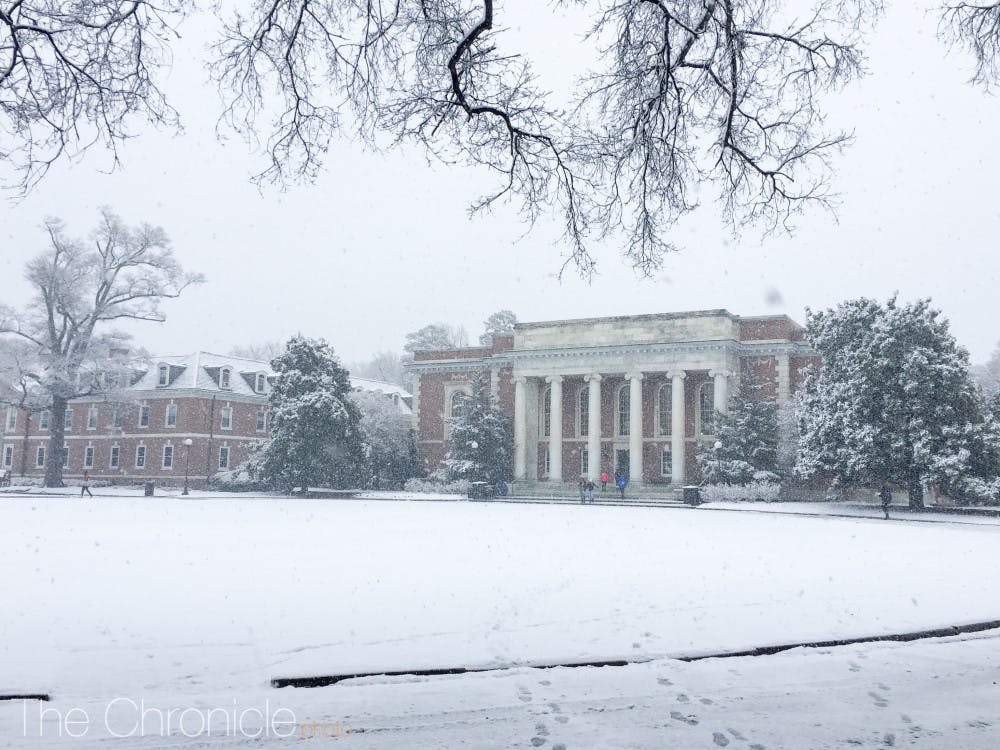
The intense debate taking place over the past several months regarding housing reform has sparked controversy. As ideas about a residential college system float around meant to undermine selective living and bolster the experience of those in independent housing, many on Duke’s campus are getting prepared for some significant changes. This past week, things got even more complicated as Duke continues to try to artificially re-engineer the social dynamic on campus.
In a recent letter, Vice President for Undergraduate for Student Affairs Larry Moneta and Dean and Vice Provost Steve Nowicki made sudden changes to the roommate selection process for freshmen in the Class of 2022. Next year’s incoming class with not have the option of requesting roommates. The survey that takes into account lifestyle preferences and living habits will remain, according to the letter.
This policy defies common sense and is just an example of elites telling students how to live their lives. With all due respect, the condescending notion that Vice President Moneta and Dean Nowicki know what’s best for students based on research that they didn’t cite nor explain is absurd. More than likely, it will lead to more conflict than is necessary, and the letter acknowledges that “compatibility challenges” are very possible. I won’t feel sorry for the HRL when it imposes its own self-inflicted wounds. A policy that forces people to coexist in the in the same room should be thought out much more carefully.
"In the last few years, we've seen increasing numbers of students who have pre-selected roommates, often with very similar backgrounds to their own," the letter read. "While this may make the transition to college seem somewhat easier, we've also seen that this can work against your having the best educational experience in the long term.”
What the letter doesn’t mention is Duke’s aggressive shift over the past few years to push their concept of diversity into every possible aspect of life. Maybe the increasing numbers of pre-selecting roommates is a retaliation to this push. It’s possible Vice President Moneta and Dean Nowicki’s abrupt attack on the housing policy may not be addressing the root cause of the issue, whatever it may be. It’s not like they asked for any student input. Furthermore, instead of completely dictating social interactions and living situations, Duke should look to balance preferences, comfortable living and challenging experiences, rather than seeking to completely and consciously abolish some of these elements.
The mandate seems more like a politically correct marketing technique to embrace multiculturalism that is neglectful of the various concerns minority students may have. In fact, some, including vice president of the Black Student Alliance Ryan Briggs, indicate that there is a disconnect between Duke administration and its students.
In a series a Twitter posts, Mr. Briggs noted, “As much as I love the idea for increased education of cultures and modes of thinking, this is at the detriment to students who simply do not feel comfortable living in a room where institutionally a roommate holds much more power over them…One thing America and Duke love to pander to when students apply to college is that they have so much control over their life, but now they do not get to choose a roommate: unacceptable.” Although I disagree with some of the content of Mr. Briggs’ sentiments, I think he makes a valid point. This policy that aims to benefit minorities by fostering diverse interactions doesn’t necessarily take into account the possibility that minorities themselves may not prefer it either.
Duke seems intent on restricting the liberty and individual autonomy of its students by basing its decision on gross exaggerations that living with someone who you are similar with is not beneficial for the college experience of exploring identity and embrace diversity. So much for college being about choices.
It also assumes that through other experiences—such as enrolling in certain classes, joining clubs and doing other social activities—Duke students will not gain enough exposure to those who are different from themselves. Just because your roommate(s) (the one, maybe two people you live with) is similar to you does not mean that you will not be getting out of your comfort zone during your four-year experience. Additionally, who is Duke to determine whether or not your roommate is similar to you. What’s next? Should we randomize K-Ville tents too?
Furthermore, the randomized roommate process already exists for people who choose to participate in it. Why impose costs on those who want to choose their roommate for no extra benefit? We can simply leave it to those who want to go random to do so and allow those who would rather pick their own roommate to do as they please.
I am not suggesting that going random is bad. In fact, it often works out beneficially. But restricting choice is simply more detrimental to the group of students who want to choose a roommate while it provides no extra benefit to the students who want to go random.
Duke is forcing the impossible. Some people simply don’t want to associate with certain others. Social pressures and human nature will often guide people to hang with others who share their interests, backgrounds and experiences, and it is naive to think otherwise. The fact is that those who want nothing to do with people different from them will continue to act the same way, and this policy interferes with natural and spontaneous social relationships.
I stand by the fact that challenging yourself is vital to a valuable college experience. But if a university really wants to stand by its students, it should put their preferences before its own agenda when reasonable.
Mitchell Siegel is a Trinity sophomore. His column, "truth be told," runs on alternate Wednesdays.
Get The Chronicle straight to your inbox
Sign up for our weekly newsletter. Cancel at any time.
Mitchell Siegel is a Trinity sophomore. His column, "truth be told," runs on alternate Wednesdays.
